

Taxpayers wasted billions of dollars on a war on cocaine that didn’t work, economists say. The U.S. government declared war on a plant.
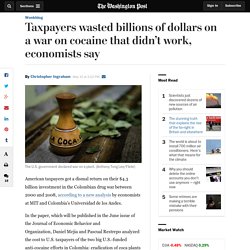
(Anthony Tong Lee/Flickr) American taxpayers got a dismal return on their $4.3 billion investment in the Colombian drug war between 2000 and 2o08, according to a new analysis by economists at MIT and Colombia's Universidad de los Andes. In the paper, which will be published in the June issue of the Journal of Economic Behavior and Organization, Daniel Mejia and Pascual Restrepo analyzed the cost to U.S. taxpayers of the two big U.S. -funded anti-cocaine efforts in Colombia: eradication of coca plants via the aerial spraying of pesticides, and interdiction efforts to block cocaine transit routes and seize shipments of cocaine.
These efforts took place under the umbrella of Plan Colombia, a decade-long U.S. Mejia and Restrepo created a sophisticated economic model to account for the costs and benefits of these efforts. Why is interdiction so much more cost-effective than eradication? Wonkbook newsletter Your daily policy cheat sheet from Wonkblog. DEA: Pot Prohibition Has Done Nothing To Limit Plant’s Availability. The federal criminalization of cannabis, a policy initiated in 1937 with the passage of the Marihuana Tax Act and one that continues today due to the plant’s schedule I prohibited classification under the US Controlled Substances Act of 1970, has done nothing to curb pot’s availability nationwide.
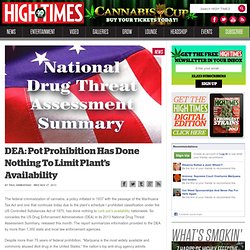
So concedes the US Drug Enforcement Administration (DEA) in its 2013 National Drug Threat Assessment Summary, released this month. The report summarizes information provided to the DEA by more than 1,300 state and local law enforcement agencies. Despite more than 75 years of federal prohibition, “Marijuana is the most widely available and commonly abused illicit drug in the United States,” the nation’s top anti-drug agency admits. “According to the 2013 NDTS, 88.2 percent of responding agencies reported that marijuana availability was high in their jurisdictions.” (By comparison, only ten percent of agencies surveyed reported high levels of availability of MDMA.)
American Justice: Marijuana Convicts Scarred While BP Execs Untouched. A protest against BP takes place in Jackson Square in the French Quarter of New Orleans in May of 2010.
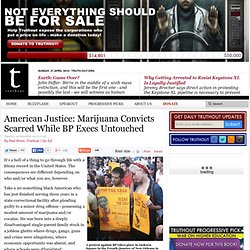
(Photo: boxchain / flickr) It's a hell of a thing to go through life with a felony record in the United States. The consequences are different depending on who and/or what you are, however. Take a 20-something black American who has just finished serving three years in a state correctional facility after pleading guilty to a minor drug offense - possessing a modest amount of marijuana and/or cocaine. He was born into a deeply disadvantaged single-parent family stuck in a jobless ghetto where drugs, gangs, guns and crime were ubiquitous, where economic opportunity was absent, and where schools were dilapidated, underfunded, unsafe and obsessed with standardized tests scores. He grew up in what researchers call "deep poverty," at less than half the federal government's notoriously inadequate poverty level (more than 1 million live in that condition).
California case tests President Barack Obama's marijuana policy. A criminal case in California is exposing the tension between federal and state laws on marijuana, and lawyers for the defendant say it is past time for senior Obama administration officials to weigh in.
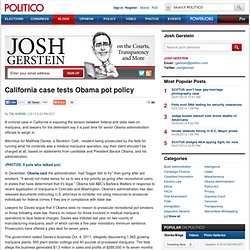
Attorneys for Matthew Davies, a Stockton, Calif., resident being prosecuted by the feds for running what he contends was a medical marijuana operation, say their client shouldn’t be charged at all, based on statements from candidate and President Barack Obama, and his administration. (PHOTOS: 9 pols who talked pot) In December, Obama said the administration had "bigger fish to fry" than going after pot smokers. "It would not make sense for us to see a top priority as going after recreational users in states that have determined that it's legal," Obama told ABC’s Barbara Walters in response to recent legalization of marijuana in Colorado and Washington. Attorneys for Davies, however, say he was operating within state law. “Mr. “Mr. “This argument is just a nonstarter in the court. Decriminalise drug use, say experts after six-year study. A six-year study of Britain's drug laws by leading scientists, police officers, academics and experts has concluded it is time to introduce decriminalisation.
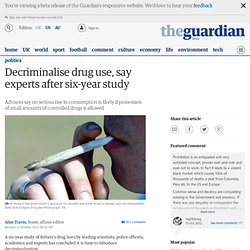
The report by the UK Drug Policy Commission (UKDPC), an independent advisory body, says possession of small amounts of controlled drugs should no longer be a criminal offence and concludes the move will not lead to a significant increase in use. The experts say the criminal sanctions imposed on the 42,000 people sentenced each year for possession of all drugs – and the 160,000 given cannabis warnings – should be replaced with simple civil penalties such as a fine, attendance at a drug awareness session or a referral to a drug treatment programme. They also say that imposing minimal or no sanctions on those growing cannabis for personal use could go some way to undermining the burgeoning illicit cannabis factories controlled by organised crime. The commission argues a fresh approach based on the available evidence should be tested.